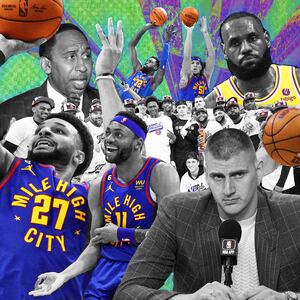On July 15, Major League Soccer, the United States’ premier soccer league, announced that Inter Miami had retained the services of Lionel Messi, the 36-year-old Argentinian forward and former FC Barcelona legend—who is widely thought of as the greatest soccer player of his generation.
Though Messi is past his prime, he is still very good. After leaving Spain, Messi went to Paris St. Germain in France’s Ligue 1—a good league but not, you know, the Spanish League or the English Premier League. He was great on a team that underachieved, but started to really feel the stress of nonstop public life as an insanely famous soccer player in Europe, playing under severe scrutiny.
But, like other European stars before him, Lionel was blessed with a middle path between the drudgery of retirement and the nonstop pressure of the UEFA Champions League: The United States of America.
ADVERTISEMENT
Here, instead of being one of the most famous people on Earth, playing in front of hundreds of millions of people every weekend, Messi gets to be a mostly anonymous rich guy in America, living in some big house in South Florida, taking the field against competition that he can bumslay, and working to expand his global brand to the one place in the western world where it means very little.
His first game this weekend featured this thrilling goal:
In 2007, David Beckham, an insanely famous British midfielder who is married to the artist formerly known as Posh Spice, signed with MLS’ LA Galaxy, a move that made a bunch of people say, “Hey, it looks like professional soccer has finally arrived in America.” They said the same thing in the ’70s when Pele signed with the New York Cosmos, and after the U.S. hosted the World Cup in 1994, and at other times for other reasons.
But Beckham’s entry into the league didn’t ignitesoccer fever in America. He was old, washed up, and was also never as good at soccer as he was famous for other reasons.

Lionel Messi during his Barcelona days.
David Ramos/Getty ImagesBut even if his arrival wasn’t a catalyst for growth in MLS, it was something of a harbinger. New teams in Portland* and Seattle began attracting crowds, and other new teams managed to not shutter immediately like they once did. Some even thrived as a niche sports product in their new markets. They were a little more competitive, too: Seattle won the Concacaf Champions Cup in 2022 and MLS players played pretty well in international tournaments.
Over the course of a decade or so, MLS went from “undignified niche product enjoyed only by sicko American Soccer fans,” to “not-terrible soccer league that also serves as a retirement home for European stars looking to vibe out and notch some goals in a country where wealth turns you into Godzilla.”
But human desire is unquenchable, and Messi’s arrival and immediate impact have people asking the same old question they always do: “Is MLS going to make it big now? Will America finally have the best teams IN THE WORLD, performing in front of packed stadiums? Will America finally have soccer fever, like we’ve always been told we should?”
The answer to these questions is, no.
Messi might be kicking back here, but MLS isn’t even the best or most popular soccer league in North America (at this point).
But in lieu of this tortured hand-wringing about America even existing in a world where they are not dominating the competition, I want to encourage the reader to ask a different question about MLS: Does it work as a product? Do people enjoy it? Is it a good time for fans and families?
Because, at this point, it seems like the answer is a resounding “Yeah, sure.”
Teams are broadly financially stable, some of them are even profitable. The league just scored a lucrative (but maybe not growth-stimulating) broadcasting deal with AppleTV and attendance is steadily climbing every year.
Will your MLS squad attract the attention of Saudi buyers looking to stash oil lucre away in an asset that gets more valuable year after year? No, probably not. But you can attract a fanbase, turn a profit, sign the odd ex-Euro star, mismanage your squad, and draw the ire of an entire city without crashing into bankruptcy.
Once, the problem with MLS was that it was a terrible product featuring horrendous American players with rancid vibes that no one wanted. Now, it's a pretty good product with less-than-horrendous American and foreign players playing in stadiums full of people who are happy to straddle the line between sincere American sports-style fandom and Euro-fan cosplay, for a smaller-but enthusiastic audience that is more than happy to watch Lionel Messi vibe out at the end of his illustrious career.
Will this product ever dominate the world or the market? I doubt it. There’s just so much American sporting capital (in both a metaphorical and literal sense) invested in baseball, basketball, and football, and it seems unlikely that this is going to change anytime in the next 30 or so years. Plus, the European powers are so entrenched, well-capitalized, and valuable that trying to compete with them is a fool’s errand.
We’re not the only obscenely big bag of money that the sports industry can seek to dry out in this big ol’ world of ours, after all. Europe needs high-end sports too.

Lionel Messi
Megan Briggs/Getty ImagesThere are certain people who this limit annoys: business writers obsessing over abstract valuations, wielders of capital trying to juice themselves to the eyeballs, American sports fans who won’t accept anything less than the finest caviar when divvying up their sports interest. But you don’t have to be that way. MLS can be a mid-sized arena for Messi to go on a big two-year American tour.
It’s fine. Not everything needs to dominate the world.
(*Disclosure: This writer worked for MLS’ Portland Timbers as a gameday event staffer for three seasons in the early 2010s. As far as jobs go, it was not bad. The hours were meager and the non-ticket-taking tasks were dull, but working a service job is alright when everyone actually wants to be there.)








